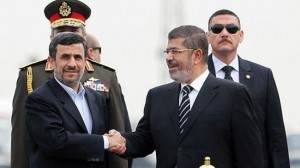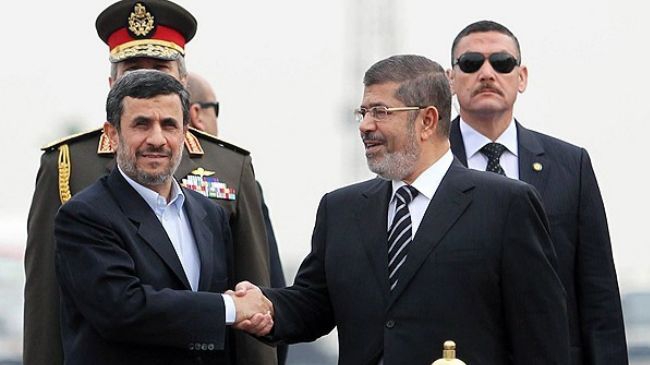 Iran President Mahmoud Ahmadinejad (L) and his Egyptian counterpart Mohamed Morsi, February 5, 2013[/caption]
Iran President Mahmoud Ahmadinejad (L) and his Egyptian counterpart Mohamed Morsi, February 5, 2013[/caption]Iran's deputy foreign minister for Arab and African affairs has called for the promotion of regional and international cooperation between Tehran and Cairo.
The two nations should enhance mutual relations, Hossein Amir-Abdollahian said in a meeting with a group of visiting Egyptian journalists on Sunday.
He pointed to the historical and cultural ties between the Iranian and Egyptian nations, saying that since Egyptís popular revolution in 2011, which toppled Western-backed dictator Hosni Mubarak, bilateral ties have been taking their natural course.
ďSo far the Islamic Republic of Iran and the Arab Republic of Egypt have had good cooperation at bilateral, regional and international levels and these ties are ongoing.Ē
Iran severed its diplomatic ties with Egypt after the 1979 Islamic Revolution because Egypt had signed the Camp David Accords with the Israeli regime and offered asylum to Iran's deposed monarch, Mohammad Reza Pahlavi.
Bilateral relations, however, have been on the mend following the Egyptian revolution.
In August 2012, Egyptian President Mohamed Morsi visited Iran to attend a summit of the Non-Aligned Movement (NAM). This was the first visit of an Egyptian president to Iran in more than three decades.
Iranian President Mahmoud Ahmadinejad also visited Egypt in February to attend the 12th summit of the Organization of Islamic Cooperation (OIC) as the first Iranian head of state to visit Egypt in 34 years.
Elsewhere in his remarks, Amir-Abdollahian pointed to the ongoing unrest in Syria and highlighted Iran's efforts to resolve the crisis within the framework of an initiative proposed by Morsi.
During an OIC meeting in August 2012, Morsi put forward the initiative of forming a contact group - comprising Iran, Egypt, Turkey and Saudi Arabia - in order to help end the bloodshed in Syria.
Amir-Abdollahian further reaffirmed the Islamic Republicís all-out support for Syria, saying the Arab country serves as a front for the resistance against Israel in Lebanon and Palestine.
The unrest in Syria began in March 2011, and many people, including large numbers of soldiers and security personnel, have been killed in the violence.
The Syrian government says that the chaos is being orchestrated from outside the country.
By Press TV
The Iran Project is not responsible for the content of quoted articles.











